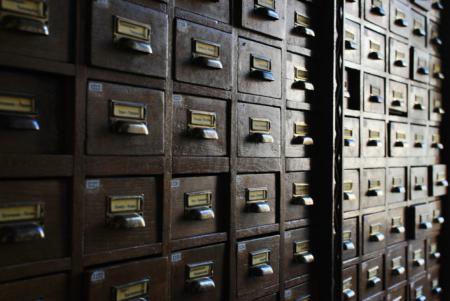The road to becoming an archivist
''Thank you Father (I think you are a Father?? Lol)."
In my conversations with researchers I often get asked about my qualifications, and it sometimes surprises people that I am not a member of the clergy. I am, in fact, trained as an archivist, and thought this column offered the ideal place to provide a more detailed answer.
I was a history major at Gettysburg College, but my interest in history started long before that time. At about 10 years of age, I went to watch a Civil War reenactment that my cousin and uncle took part in, and it kindled a lifelong interest in the Civil War era. When it came time to choose a college, there was only one option for me.
Throughout my undergraduate studies, the path before me was never obvious. While I loved history, did reasonably well in classes, and enjoyed it, I did not consider myself to be a standout history scholar. I loved researching, and I loved writing, but my original goal of pursuing a Ph.D. seemed a daunting prospect as senior year approached. Fortunately, at the end of my junior year, I was hired as an intern for the Special Collections Department of the library, which I would start the following fall semester. Though I had visited the Special Collections Department for class assignments, this was my first look at what it was like to be on the other side of things.
My first project, well-suited to my interests, was transcribing the diary of a Civil War soldier. In addition to the transcription, this also meant applying for the soldier's pension record, consulting regimental histories, and putting his experiences into context. This is what we call "processing a collection." In this case it was just one item, but collections can range up to thousands of items -- diaries, correspondence, photographs, book volumes, etc. When processing, the goal is to "arrange and describe" all of these materials so that they can be located with relative ease. Often, a processed collection will result in a collection guide which provides a contents list, and also a description of the collection -- material types, quantity, date range, etc. -- biographies of the contributors, timelines, and other information to help researchers determine if it is relevant to their work.
My stay was later extended to the spring semester, and then through the following summer, during which time I had the opportunity to process two additional diaries, a small collection of letters between a soldier and his sister, and a larger collection of records from a now-defunct department at the college from the 1950s and 1960s.
The critical step towards pursuing this as a career came during the fall semester of my final year. While speaking with one of my professors about how much I enjoyed working in the Special Collections, he informed me that if I wanted to pursue this as a career, I should look into a Masters in Library Science (MLS) program. This was something I cannot recall hearing of, or considering, at an earlier date.
After researching several programs, and looking where they could lead in terms of a career, I knew this was the right step for me. I also decided to pursue a Master of Arts in History simultaneously, as it was my first passion, and one of the schools that offered this option was Simmons College in Boston.
Everyone who joins the program, whatever their concentration or interests, must take core courses which include offering reference help, organizing information, evaluating library operations, and several others, but the most fulfilling aspect, for me, took place outside of the classroom. That was where I learned the many facets of being an archivist, which can include: overseeing the long-term preservation of a collection, writing library user guidelines, providing reference/ research assistance, evaluating reference services, processing collections, designing storage spaces, setting up exhibits, searching databases, describing digital collections, and preserving digital content, among others.
I am very grateful for all of the opportunities I had during my three years as a student which included positions at the Tufts University School of Medicine, the Episcopal Diocese of Massachusetts, Berklee College of Music, and most recently the Massachusetts Historical Society.
As is evident from the list above, not all of my experiences were history-related, and those interested in pursuing an MLS should know that there are plenty of options within the field. While I chose to concentrate on archive management, others can choose to focus in other areas such as cataloging library materials, children's literature, digital media, special libraries (law, medicine, etc.), or a number of other areas.
If anyone is interested in pursuing an MLS, or a career as a librarian or archivist, please feel free to contact me with questions (Thomas_Lester@rcab.org).
THOMAS LESTER IS THE ARCHIVIST OF THE ARCHDIOCESE OF BOSTON.



















